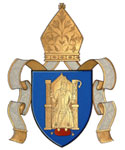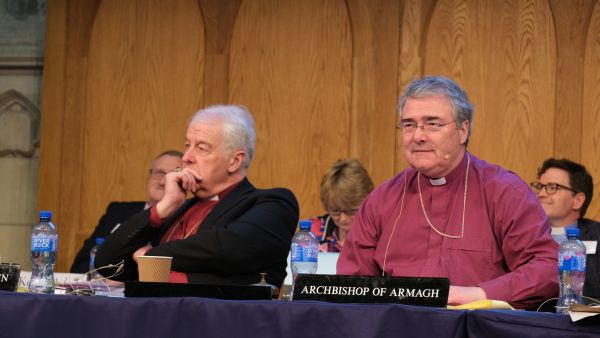 |
 |
News
General Synod debates housing, ministry and education

Archbishop Michael Jackson and Archbishop John McDowell at the General Synod.
There was plenty of debate at the General Synod during the second and third days on various topics.
A motion on the housing crisis was proposed by the Church and Society Commission.
Proposing the motion, Neville Armstrong, Clogher Diocese, called for General Synod to recognise that helping people affected by the housing crisis must be considered an essential part of the Church’s mission and ministry. The motion asked the RCB and Standing Committee to work with parishes and dioceses to identify ways in which the Church can directly help those in need, and can assist the relevant authorities in both Northern Ireland and the Republic of Ireland to respond to this crisis.
Neville Armstrong said: “on this small island of ours the promise of dignity and contentment remains a distant dream for many. The perfect storm that has been Brexit, pandemic and now the threat of global warfare all conspire to cut off young families, single mothers, people living on the economic margins from the opportunity to live in safety and comfort. We dream of building enduring sustainable communities through social housing but every year our targets are never met and the gap between demand and supply grows ever wider”.
He said that society needed to commit to increasing the development of new sheltered and supported accommodation that can help the vulnerable and reduce pressure on social services and health care. This would mean approaching new ideas and new ways of doing things.
He said that people of faith could play a part in recognising how having sustainable, affordable housing could help build urban and rural communities in a balanced and progressive way. He said that we needed to find ways to protect those most in need and demonstrate the importance of social cohesion and strong communities.
The Revd Colin McConaghie (Clogher) commended the motion. He said that this was a national crisis and not just a problem for big cities. He suggested working with Habitat for Humanity Ireland who are experts in this field.
Canon Trevor Sargent (Cashel, Ferns and Ossory) said this was an opportunity to lobby the government of Ireland, 50 years after the Kenny report on homelessness and housing. Subsequent governments failed to enact recommendations of the report on speculation due to challenges in the courts under Article 43 of the Constitution. He said it needed to be challenged and it needed the strong voice of lobbyists and the Church to see that the Kenny Report be implemented.
The motion was passed by Synod.
The Working Group on Pioneer Ministry brought forward proposals for pioneer ministry at General Synod.
The motion aimed to reach more people outside the Church in a way that complements existing ministry within the Church of Ireland.
Proposing the Motion, Bishop of Kilmore, Elphin and Ardagh, the Right Revd Ferran Glenfield presented the report of the Pioneer Ministry Working Group. He outlined the key proposals which include:
• Establishing a National Leadership structure for Pioneer Ministry
• Engaging with dioceses to promote and prepare pioneer posts
• Partnership with Church Army to deliver training for pioneer ministers.
• Dedicating financial resources from the RCB and dioceses to train and deploy paid pioneer ministers.
He said that Pioneer ministry was not a replacement for pastoral ministry in its current forms but that traditional and new models of church should complement each other offering choice. The report recommendations build on a range of church plants and outreach initiatives already in place in the Church of Ireland, he explained. The proposals draw heavily on the experience of Pioneer Ministry in other Anglican churches in these islands and beyond.
He said that the report had been endorsed by the House of Bishops, the Standing Committee and the Executive Committee of the RCB. It is planned to establish the National Leadership Structure, largely through secondment, by this autumn. Any legislation required for Pioneer Ministry in relation to the Constitution of the Church of Ireland, would come before Standing Committee and General Synod in 2023. The Bishop stated adding that details of the financial resources required for the training and deployment of paid pioneer minsters were being worked through and would be in place when needed. The first pioneer ministers would start training and deployment in 2024. Over the next decade up to 30 paid pioneer ministers and projects will be in operation, he stated.

The report of the Board of Education was presented at General Synod continued to work in Northern Ireland with other churches to ensure that education was shaped by the core values of the Christian faith at a time when these were under increasing societal scrutiny. The board also contributed to parish projects working with local schools, he said adding that it would open access to this fund before the end of June.
The Board further funds the Church of Ireland Lecture at Queens University through the HUB Chaplaincy Centre, he said. This year’s lecture is available on the HUB website. https://thehubbelfast.org/
The board recognised the professionalism and dedication of all involved in schools who worked in the context of the continuing pandemic and thanked governors, school leaders, teachers, ancillary staff and parents for the support they had given to children and young people at a time when schools had faced unprecedented challenges, he said.
Canon Kingston spoke about the work of the Education Authority. The Church of Ireland is represented on its board by the Revd Amanda Adams and Frances Boyd. He said that a major area of pressure in the Northern Ireland education system continued to be the provision of appropriate education for children and young people with special educational needs.
He said that Church representation on the Education Authority provided a particularly important input to decision making in the context of the Transferor’s right to appoint governors to Controlled schools. Over 1500 Governors were appointed to individual school Boards and played a pivotal role in the governance of these schools and provided an opportunity for the maintenance of a strong Christian ethos, he stated. He said that the board encouraged parishes to make all efforts to ensure that all Transferor seats were filled in this process and stressed that it was essential that the church used the opportunity to have individuals at the hub of school decision making and accountability.
Speaking to the report with reference to the Republic of Ireland, Joan Bruton (Meath and Kildare) said that parish primary schools in the republic played an enormous part in faith development. So she commended the teachers and Rectors who held imaginative services. She promoted the SEC schools which in general had a Christian ethos which provided an opportunity for teenagers to get together for worship which was relevant to them.
Speaking about the activities of the Board in Northern Ireland, Judith Cairns (Connor) said that there was a huge opportunity in 2023 to ensure that the right people were on the boards of Transferor Governors. She said there was an opportunity to protect and promote the Church’s values. She urged members to think about finding the right people for these roles.
Revd Catherine Simpson said was one of the people serving on the TRC. She thanked all who served on boards of governors. She asked people to pray for local schools on Sundays, support local schools and apply for funding. She spoke about a project in the Hollywood area where a drugs programme was set up to talk about drugs in local schools. She encouraged everyone to get involved.
Bishop Ian Ellis (Clogher) paid tribute to Ken Fennelly and the secretary of the Board of Education NI, Peter Hamill, who he said was equally good at providing support. He addressed the issue of the emotional health and well-being of young people. He said there was not enough support for young people’s well-being in schools. He said there were many children suffering with general mental health issues and anxieties who were waiting for months for support. He urged an increase of resources in this area.
The Report of the Commission for Christian Unity and Dialogue was presented at General Synod.
Proposing the report Glenn Moore (Clogher) said that the commission provided the opportunity to engage with many other churches. He welcomed the appointment of the Bishop of Derry as president of the Irish Council of Churches.
He said the Covid presented a situation where face to face activities could not happen and observed that new relationships and friendships needed to be developed in person. He looked forward to more interaction as the covid situation improved. He pointed out that interactions with churches beyond our own borders helped with reaching out to people coming to our country. He thanked all involved in the commission.
Seconding the report, the Revd Katherine Poulton talked about the CCUD working groups. There are three active working groups focussing on Anglican and Ecumenical Affairs, European matters and Interfaith issues, she said.
She highlighted the work of the Anglican Consultative Council and said the Church of Ireland had representatives on a number of Anglican Networks. The Anglican and Ecumenical Affairs Working Group plans to continue linking with our network representatives to strengthen the links which are already established, she said.
The Interfaith Working Group advertised a competition run by the World Council of Churches on the future of Interreligious dialogue. One of the five winners of this competition was the Revd Christopher West, Curate Assistant in Enniskillen. The group has some interesting plans for the future, when Covid allows, and is exploring the idea of a conference or seminar on a pertinent issue, she stated.
The European Affairs Working Group works closely with the Irish Council of Churches European Affairs Committee and the Conference of European Churches, keeping abreast of issues which may impact people and the group notes that members feel they need to consider their place in Europe and the key international relationships which will be needed for the future, she reported.
Commenting on the report, Bishop Andrew Forster (Derry and Raphoe) spoke about the Irish Council of Churches and the Irish Interchurch Meeting. He said it was one of the highlights of his ministry to be involved in this organisation. He added that when people seek to grow in unity they become vessels of joy and engagement. He said that ecumenical engagement had been seen to be the enthusiasm of a few but it needed to be the passion of all in a secular world where God needed to be known.